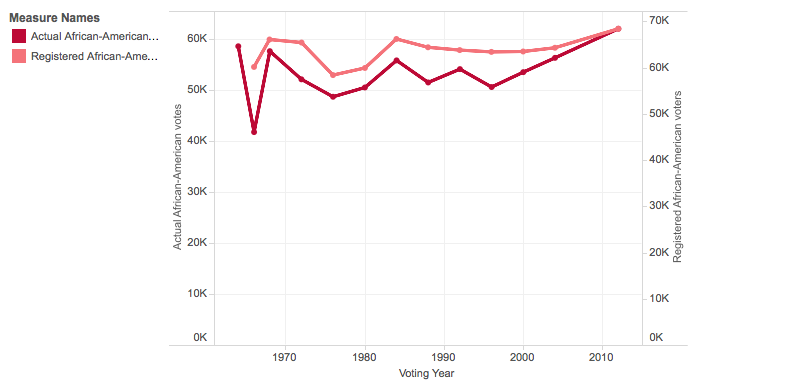The Civil Rights Act of 1964 was enacted to end segregation and to administer systems to promote equality specifically for African-Americans, now at 50 years later… what does progress look like?
The foundation for what would become the 1964 Civil Rights Act was outlined by President John F. Kennedy in 1963, just months before his assassination during his June address. In his speech, Kennedy discussed several areas of needed measures to establish parameters to better equality including voting, poverty and education.
According to the U.S. Census Bureau, the percentage of African-American voters increased from 58 percent to 62 percent, which may not sound like much progress. However voting among African-Americans exceeded white voters for the first time. Overall, voting participation has increased.
African-Americans voting 50 years after the Civil Rights Act.
Nevertheless, in 2014 the Shelby vs. Holder 2013 decision dialed back voter protections from the 1965 Voting Rights Act and according to the Brennan Center for Justice, voter suppression tactics are on the rise.
“50 years ago, there was a march, and on July 2nd, two days before Independence day, America, in a bi-partisan way came together and said, every American should have the right to vote,” Congressman Steny Hoyer, D-Md said as he commanded support at a rally to reinstate these protections this summer. “And by the way we’re going to make sure you don’t discriminate in your state, in your jurisdiction that prevents people from voting directly or indirectly,” he said.
Many are anticipating the effects of these tactics to manifest in years to come unless amendments to replace the protections are enacted. At present, that legislation is pending actions by congress.
Poverty is another area of focus monitored by the Census Bureau in the aftermath of the enactment of the Civil Rights Act 50 years ago, but accounting for progress for African-Americans appears to be complex.
Although the Census Bureau’s data shows that poverty declined from 42 percent to 28 percent for African-Americans, the actual amount of blacks living below the poverty line hasn’t changed as shown in the bar graph. The causes of the challenges of persisting poverty seem obscure.
One major change from 50 years ago is the advent of the Internet. Although many might believe that the Internet would level the playing field, it may be the increase of accessibility and use of big data that might be undermining progress for African-Americans.
According to recent research by the World Privacy Forum, people living at or below the poverty line are being undermined by the use of new consumer scores that are being bought and sold. The World Privacy Forum report, “The Scoring of America,” documents hundreds of scores being bought and sold by companies called data brokers. The scores are acquired from marketing information and Internet activity to predict behavior and are used by credit agencies and service providing businesses. WPF Executive Director, Pam Dixon said that tactics like these contribute to perpetuating poverty.
“You know it’s difficult enough being poor but nowadays with data brokers this poverty is just perpetuated across list after list after list and then it enters into your predictive equations and you may receive much less favorable customer service, much less favorable initial offers from companies for services,” Dixon said. “You may not even get the same life opportunities as other people who isn’t living in poverty, and this is of great concern to us. Because it’s not going away.”
https://public.tableausoftware.com/views/CivilRightsActPovertyLevelsoverlast50years/Sheet1?:embed=y&:display_count=no
African-American Poverty over time.

